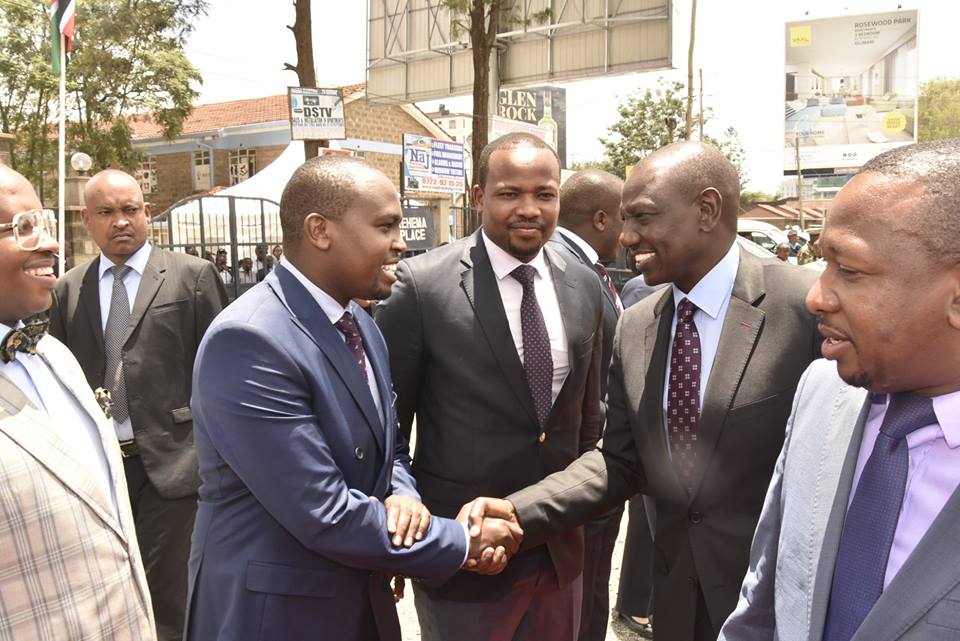Hon Gideon Keter with Deputy President William Ruto at a past function in Nairobi.
One of the ways the youth can be empowered is by them actively being part of the leadership and having their say in decision making. Youth leadership is a subject that has gained traction in recent years. More than before the youths are now embolden, courageous and ready to take leadership and chart a better future for fellow youths and the generations to come. The adage, “youths are the leaders of tomorrow” probably stopped making much sense, when the youths sobered up and endeared to be part of the current leadership rather than waiting longer on side-lines.
In the wake of the 2017 General Elections, the Kenya leadership experienced a paradigm shift of sorts. There was a significant increase in the number of youths elected across the National and County elective positions. This change of affairs can be attributed to sustained empowerment calls to the youths to stand up and take their rightful place at the table.
Majority of the voters in Kenya comprises of youths between the age brackets of 18-35 years. In this respect it was a matter of youths speaking in one voice, marshalling their votes and putting some of their own in leadership positions. This is a script that was played out well and as a result the youth in the county are adequately represented.
The determination by the youth to have one of their own occupying a leadership seat, was inspired and spurred by the desire to be represented by someone who has at some point experienced, can relate and is well conversant with the challenges the youths face in their day to day living. Such a youth leader is better placed to initiate and implement social development policies suited for the modern day youth. Old guards, who were not in touch with the dynamic needs, were wiped out by the strong wave of the youth’s determination.
In this era common problems that the youth are facing are: joblessness, unemployment, drug and substance abuse, economic challenges and even lack of information on access to youth fund lending entities where they can get capital to initiate self-employment activities. Therefore the youths needed a youth’s voice which could easily articulate their issues as well as finding viable solutions.
In a society where the youths are grappling with destitution and hopelessness as a result of joblessness, it was only necessary to get it right at the ballot by electing fellow young adults who could reason with them and provide remedies in a consultative and cooperative way. Besides being representatives, young leaders in office are also role models, who the younger aspiring leaders can look up to. The onus is therefore on them to work harder, deliver results and transform the society. As such their successes will be an indication that the youth are capable and can be relied on to steer transformative leadership.
Most of the young leaders in Kenya were elected because they presented what they could do to better the lives of their fellow youths. Some even overcame seasoned and wealthy political opponents who carried out well-funded campaigns. Their self-belief and support they got from the change-yearning-youth secured their victory.
Some of the youth leaders have hit the ground running in formulating youth friendly polices. Nominated MP Gideon Keter has drafted the HELB ACT Amendment bill, which is meant to waive on the principal amount loaned out to the university and college students. The bill came as a sigh of relief to thousands of Higher Education Loans Board (HELB) beneficiaries, who are required to repay huge amount of money accrued with interests and penalties. The bills if passed and signed into law will subsidise the loan amount payable, and safeguard the beneficiaries from punitive legal and financial penalties. The young MP says that the government had failed to recognize that most youths who graduate hardly find jobs and hence they can’t be in a position to service their HELB loans.
With the young leaders taking upon themselves to try and come up with remedies to address challenges facing the youths; it gives hope of a brighter future. The young leaders only need to foster a good working relationship with the youths who elected them. With time the youths are more likely to gain confidence and the conviction to aspire for social-economic prosperity and independence. In this regard the active participation of the youth in leadership is a step in the right direction towards enhancing youth empowerment


